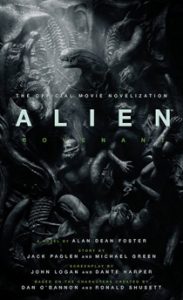Although I gave “Alien: Covenant” a good review earlier this summer, I did sympathize with one Amazon reviewer’s all-caps suggestion to the filmmakers: “Stop killing off main characters between movies.” This is a reference to the infamous decision to start “Alien 3” by killing off Hicks and Newt, and the franchise’s (arguably) repeated mistake this year, as “Prometheus’ “ Elizabeth Shaw is dispatched offscreen before the events of “Covenant.”
In the back of my mind, when watching the mid-film explanation of Shaw’s death, I subconsciously thought “Noomi Rapace must not have been available for the sequel.” However, research reveals that director and franchise overseer Ridley Scott and his four-man writing team simply made a narrative choice. (At one point Rapace was slated for a cameo appearance, but eventually that idea was dropped.)
As it relates to David’s arc, the decision is defensible. “Prometheus” ends with the synthetic David as a trustworthy ally of lone human survivor Shaw as they take off in the Engineers’ ship; he has just saved her life, after all.

So when David appears on the Engineers’ world (where the Covenant has landed) and says Shaw died in their crash-landing a decade earlier, there’s no reason to doubt him. Then, when flashbacks show us David poisoned the native Engineers and when it’s suggested that he killed Shaw in order to experiment on her, the twist serves as the culmination to the question of David’s loyalty that simmered through a film and a half.
Still, Shaw was the main character of “Prometheus,” and it seems like she at least deserved a flashback scene in “Covenant” – maybe something to show she went down fighting against her betrayer.
Foster’s fourth novelization in the saga
It was with the hope of more exploration of Shaw’s demise that I picked up Alan Dean Foster’s “Alien: Covenant” (May, paperback), the author’s fourth novelization for the franchise, following his outstanding “Alien” and “Aliens” and a rushed “Alien 3.” Novelizations of “Alien Resurrection” and “Alien vs. Predator” were written by other authors, but “Prometheus” did not get a novelization, despite being tailor-made for one. But with Titan Books betting there’s still a market for novelizations, “Covenant” has found life on the bookshelf.
Unfortunately, it doesn’t give any more specifics of Shaw’s demise. (And it looks like Foster’s Sept. 26 prequel, “Alien: Covenant Origins,” will also dodge this narrative point, instead focusing on the background of the Covenant mission.)
But if future films focus on the Covenant survivors – Daniels, Tennessee and the nefarious David – rather than killing them off to make way for the next hapless batch, I’ll be OK with Foster’s “Covenant,” which spends much of its time introducing us to the crew of this colonization ship, a few too many of whom come off as little more than xenomorph fodder in Scott’s film.
As is the franchise’s wont, everyone is commonly referred to by their last name, which is a bit of a problem in printed-word form, as it’s harder to tell who is male and female. In the original “Alien,” Ripley and Lambert were the only women, but the Covenant crew is made up entirely of couples, so there’s roughly an equal distribution of genders (There is one gay male couple, too).
Speaking of major characters being killed off between films, Daniels’ husband Jacob is killed in his cryo-tube in the opening scene. He feels like a major character because he is the Covenant’s captain and he is for some reason played by traditional leading man James Franco.
Starting in a dark place
“Alien” movies love starting their heroes off in a dark place (It’s just a shame when that means Hicks, Newt, Shaw and James Franco have to be sacrificed). Despite my early stumbles over who’s who, I ultimately got a good feel for which characters lose which spouses as the story progresses. The way the religious Oram, the new captain, tries to leave faith out of his decision-making is also explored more.
David, though, steals the show in the book, as Michael Fassbender does in the movie. Starting with the flashback scene where he serves tea to his creator, Peter Weyland (he of the Weyland-Yutani Corporation), we understand David doesn’t intend to live a life of servitude. Following the Engineers’ lead, he aims to create life, and he picks up their genetic experiments that lead to the titular xenomorphs.
While this narrative thread is of course central to “Prometheus” and “Covenant,” those films play things coyly. Foster thankfully makes some points crystal clear: The Engineers are not gods, but they like to play god. Humans are among their creations, as are the proto-xenomorphs (the genetic engineering of which is picked up by David).
Humans share the Engineers’ hubris, both in their false belief that they were created by gods and in their belief that they can play god to other beings, namely the line of synthetics, of which David is an early model (Walter follows in “Covenant,” and then there’s Ash, Bishop and Call in the “Alien” quadrilogy). We also learn why David seems more advanced than subsequent models: The creativity programming is purposely dampened as the line goes forward, as it becomes clear servitude is more valued by the Company employees who work with synthetics.
The colonizers
Foster suggests that humans are venturing into the void and looking for worlds to colonize largely because the Earth is becoming less habitable to humans. Indeed, this is a major reason why David isn’t swayed by the notion that humans are the be-all, end-all of sentient life in the universe. On page 272, David says to Walter:
“… Humans are a dying species, grasping for resurrection. They are an accident, a demonstration, an experiment. A failed experiment. One does not perpetuate or repeat a failed experiment. Instead, one begins anew. With a better idea, a better template. They don’t deserve to start again. And I’m not going to let them.”
Foster doesn’t precisely say why the Earth is in rough shape, although since the whole “Alien” franchise has a dystopian undertone, we can presume 2017’s global issues continue to 2104, when “Covenant” is set. David makes references to classic human bad behavior, such as tribalism.
Making things murkier, when the Covenant crew stumbles across a message containing John Denver’s “Take Me Home, Country Roads,” Foster reveals that the notion of West Virginia — as in, the notion of political boundaries — is an outdated idea by this time. (This is ironic considering that the pilot is named Tennessee, although I suppose there’s still a Tennessee River.) Of course, the end of political boundaries is not in and of itself a good or bad thing; we’d need more information to see if it is on the whole good or bad for humanity. Count David as unimpressed, though.
Modern times become ancient times
References to anything we’d consider common knowledge in 2017 are ancient and nearly forgotten in the 22nd century, yet – aside from advanced technology – “Covenant’s” 2104 references are only to what they lack (for example, West Virginia).
Rather than a bug, I’d argue this is a feature of the “Alien” saga, something that enhances its bleakness. These characters are looking to survive, and yes, they have their spouse on this mission because that allows them to fit the Company’s optimum psychological profile. However, it’s only the synthetic David who is deeply interested in drawings, classical music, science and history.
The history of the xenomorphs (whom Foster labels as capital-A Aliens in this book, while using the term “neomorphs” for the white-skinned progenitors) seemed a curious thing in the wake of “Prometheus” and the film version of “Covenant.” They were around during the time of ancient Egypt (as revealed in “Alien vs. Predator”) yet we’re seemingly getting their origin story in “Prometheus” and “Covenant.”
But these films are actually about David RE-CREATING the Aliens. On page 243, David tells Oram about an Alien egg fossil: “In case you are wondering, I had nothing to do with it. It lies as I found it, a supreme example of the Engineers’ skill.”
Foster’s “Alien: Covenant” gives me a good feel for where the narrative is at right now. The crew becomes more fleshed out and David’s status as great villain is enhanced by getting into his head more. Some scenes work better in the movie – for example, we see David’s genocide of the Engineers rather than just hearing about it – but many are embellished by Foster’s prose. I just hope Daniels and Tennessee don’t wake up dead in the next movie.
Click here for John’s reviews of all the “Aliens” and “Predator” films.


